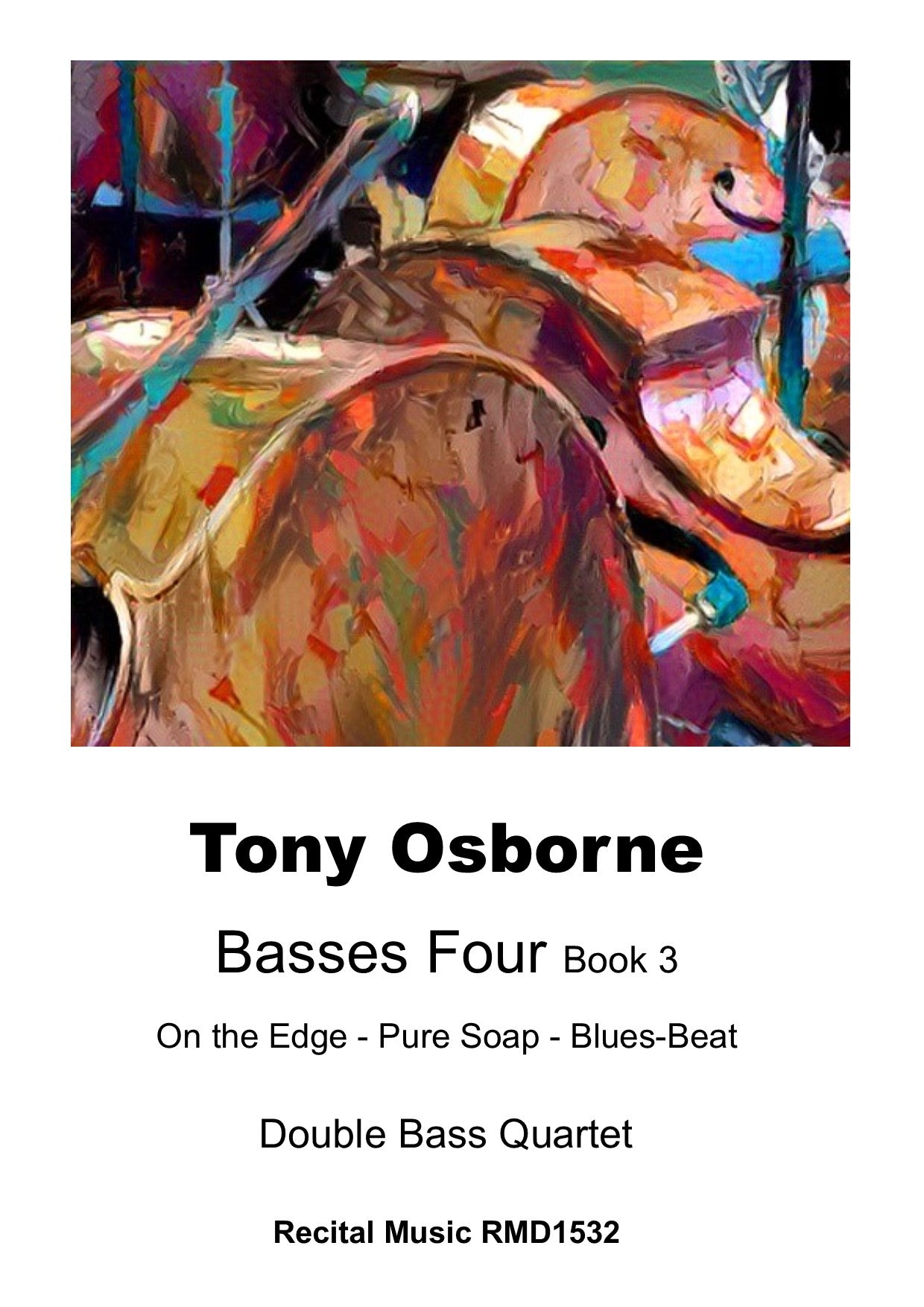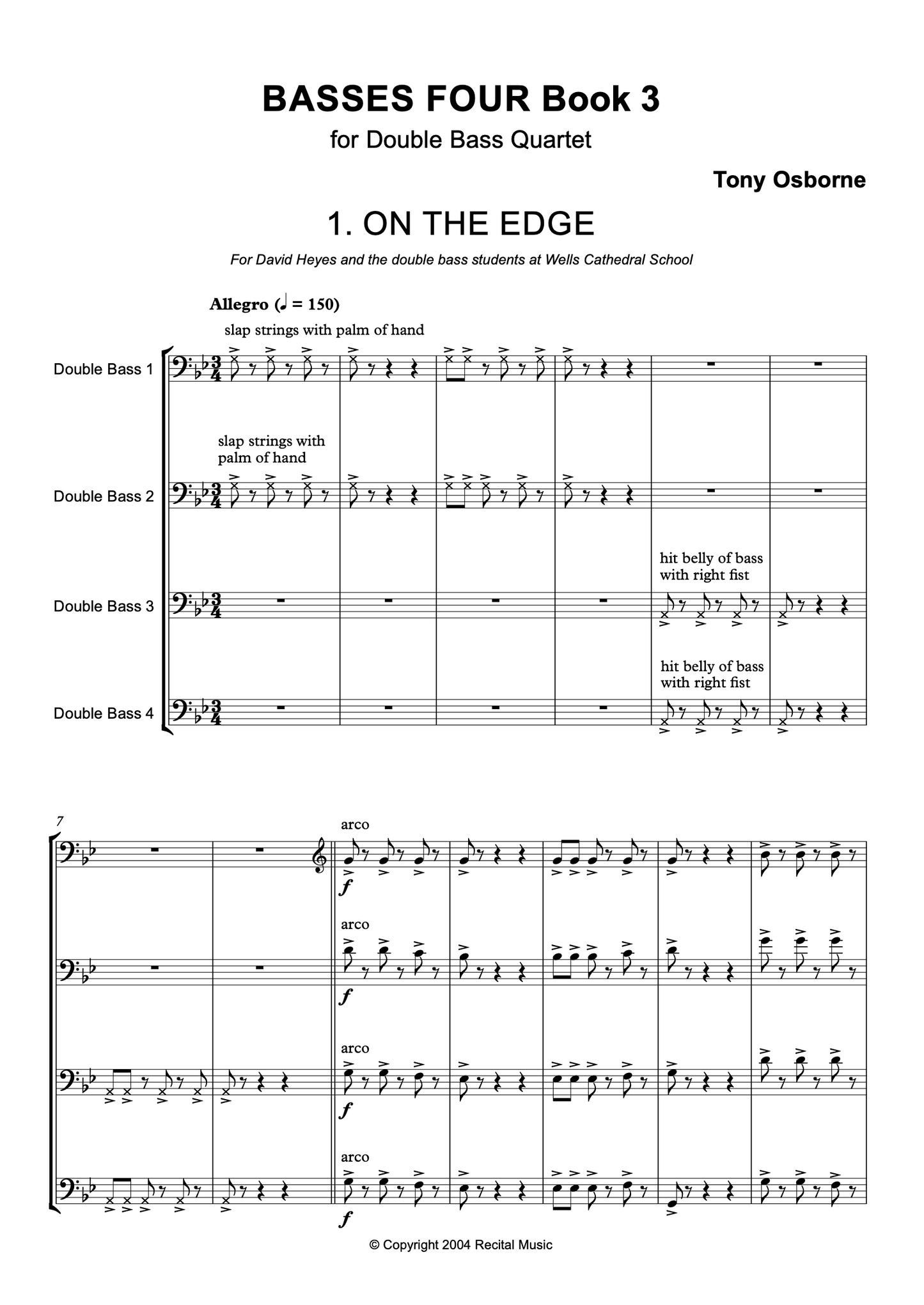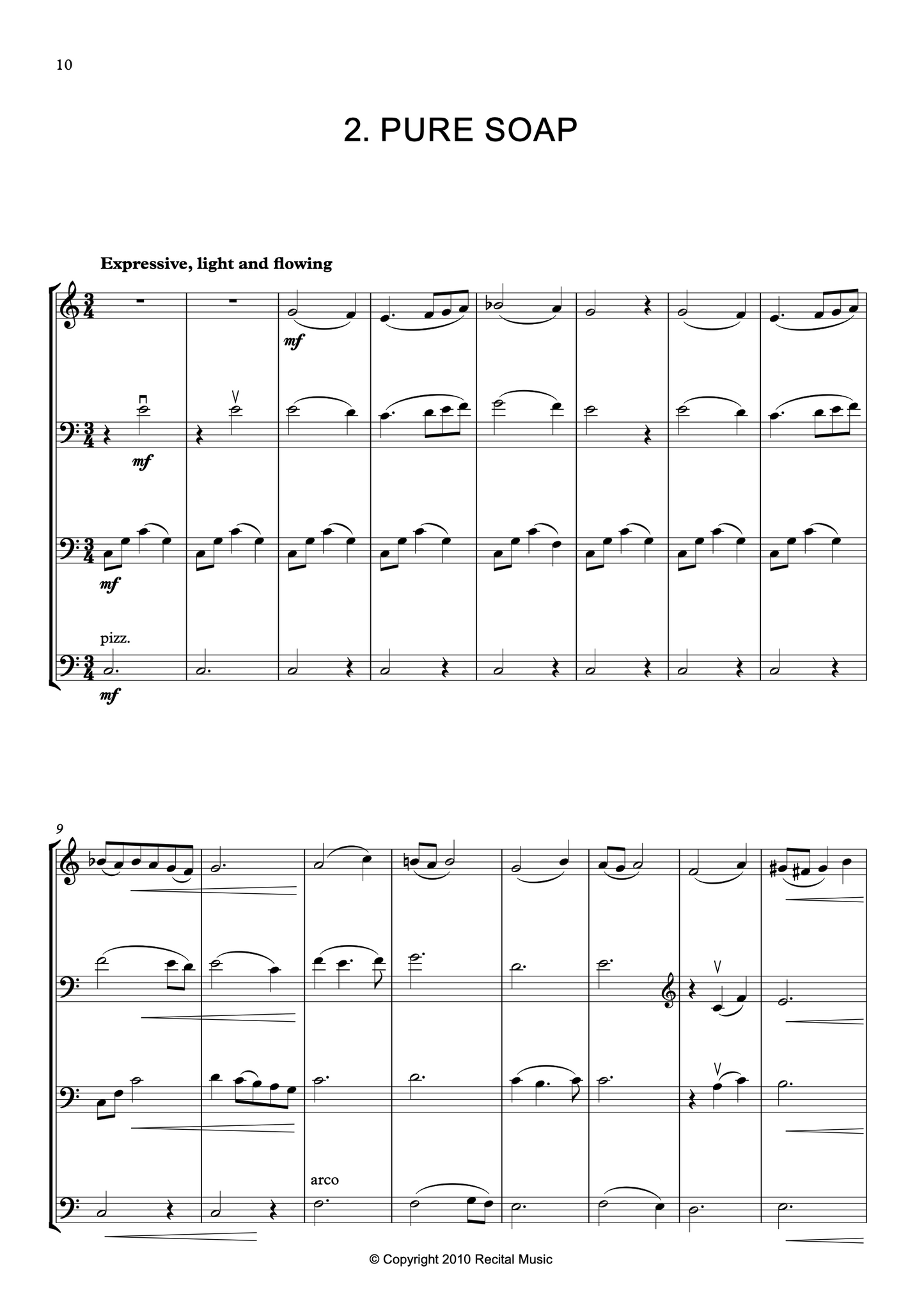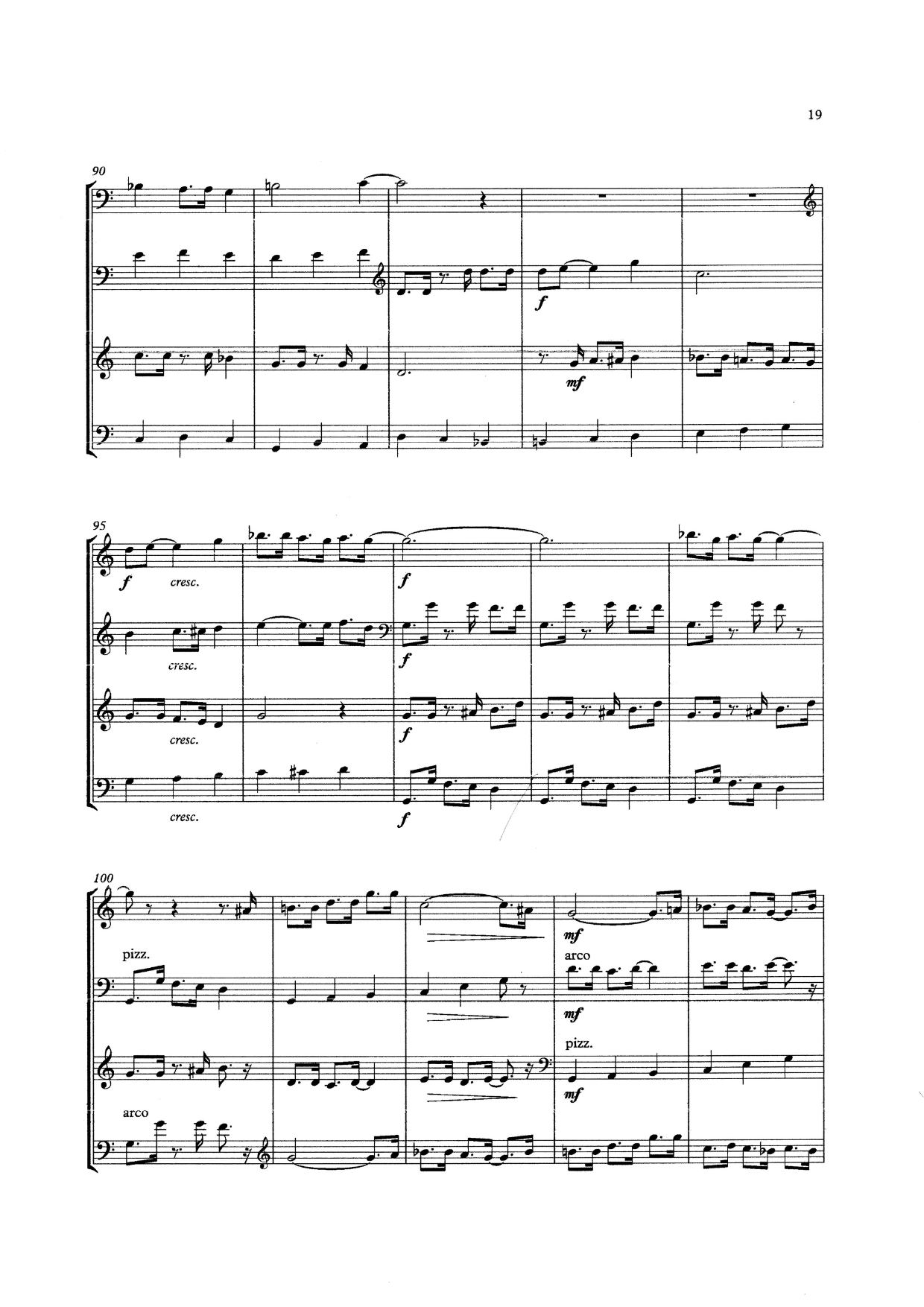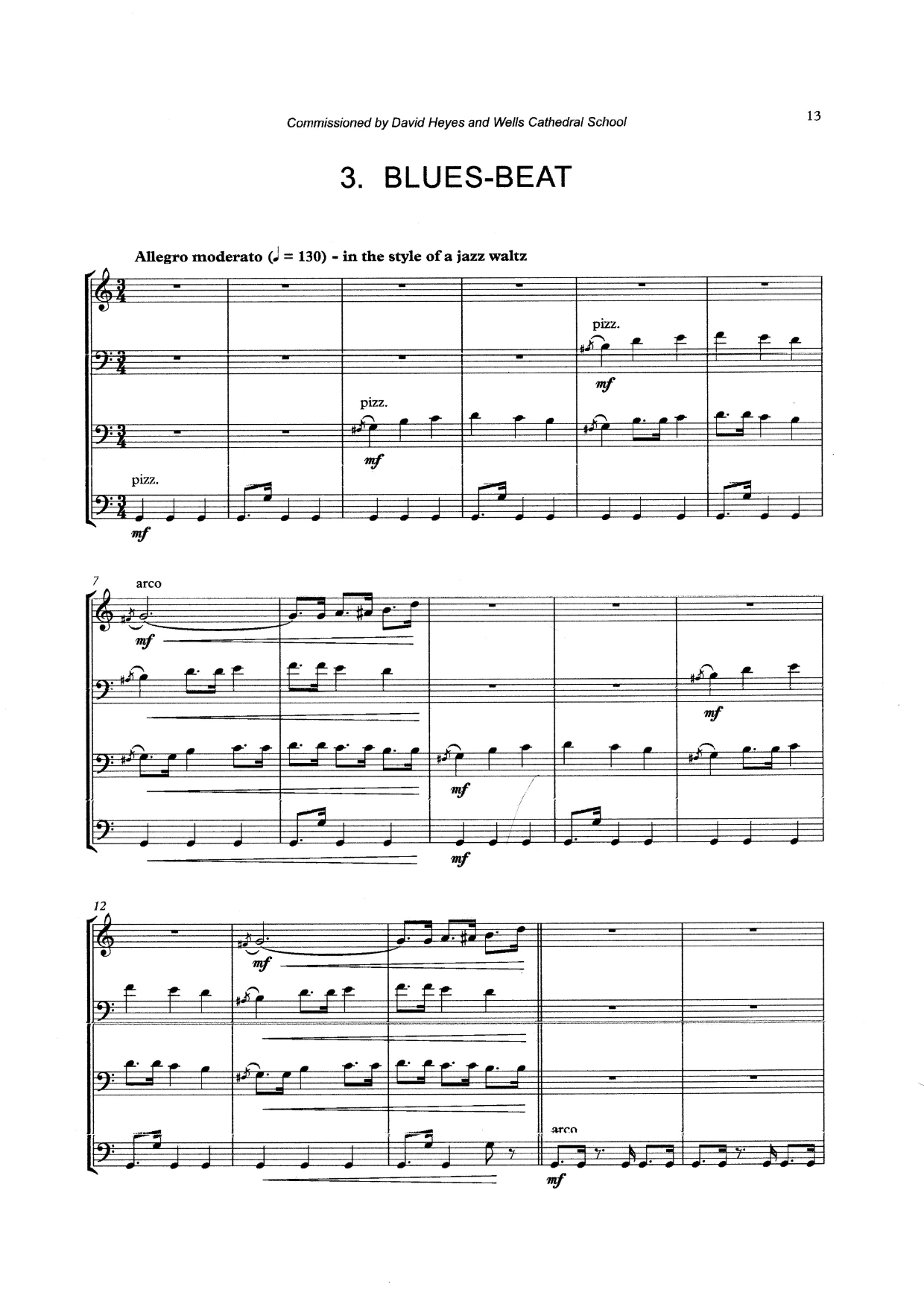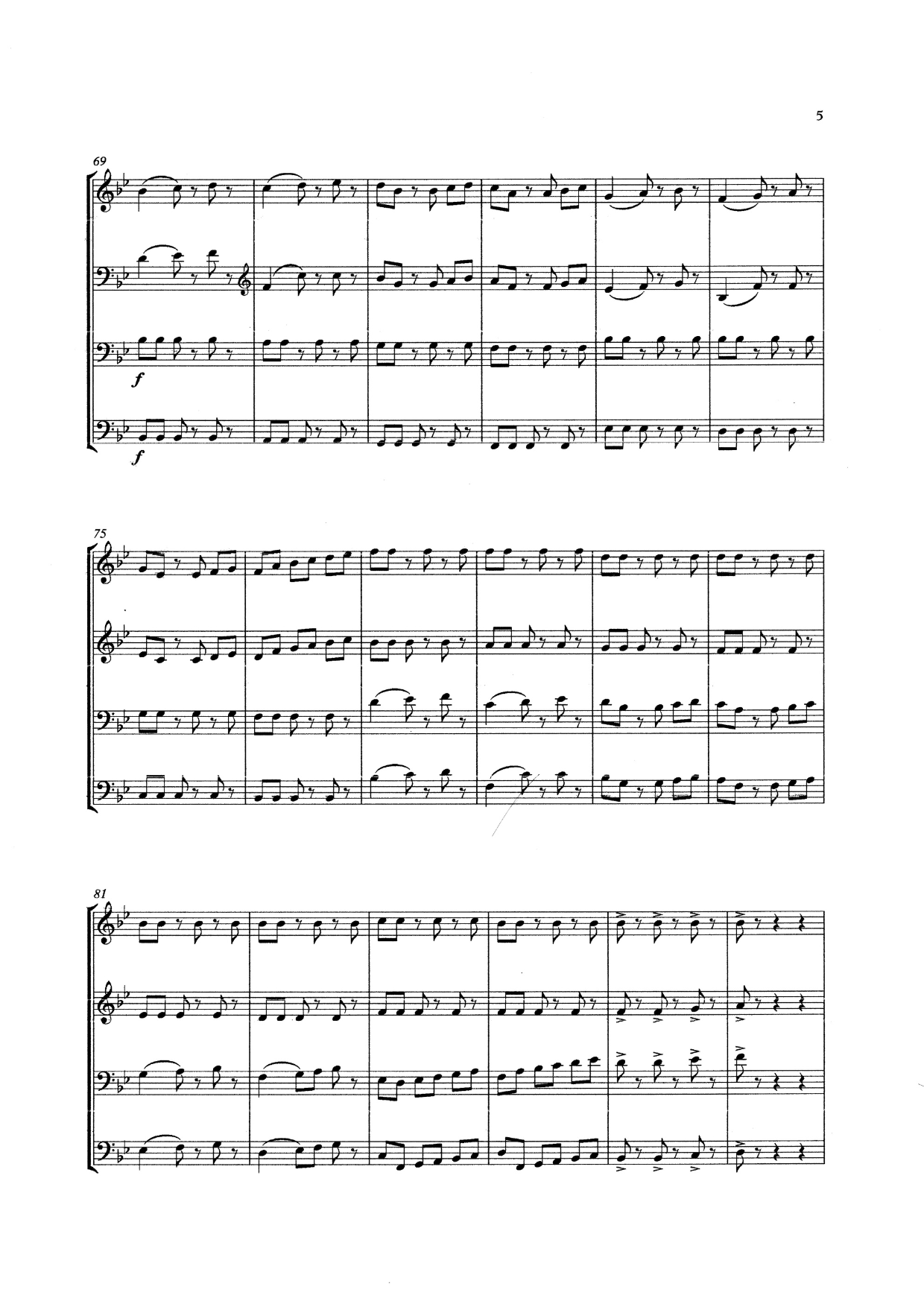David Heyes
Tony Osborne: Basses Four Book 3 for double bass quartet
Tony Osborne: Basses Four Book 3 for double bass quartet
Couldn't load pickup availability
About the Book
Basses Four Book 3 brings together three fun and vibrant pieces which are aimed at the intermediate quartet. They are colourful and inventive, offering musical and technical challenges in equal measure, and written in engaging and appealing styles which is typical of Tony Osborne’s upbeat and adventurous musical language.
Table of Contents
1. On the Edge is lively and rhythmic, typical of Tony Osborne's jazzy and accessible music. Ideal for the good intermediate quartet, there are effective musical and rhythmical challenges for each player and the addition of percussive effects gives another dimension to the jazz-infused style. Bass 1 plays in thumb position with Bass 2 venturing into low thumb position, but everything is playable and the quartet has been successful and popular in performance. On the Edge was written for David Heyes and the double bass students at Wells Cathedral School (Wells, Somerset), where it was premiered on 27 February 2005.
“On the Edge was composed in 2004 and is all about rhythm and vitality. It has a rugged and powerful drive which is set in the opening bars - at first using percussive effects and then stated in G minor. A bridge section, played col legno, leads into a restatement of the theme. An insistent ostinato figure for basses 1 and 2 accompanies the second theme, here introduced by basses 3 and 4, then the parts are switched around, followed by a recapitulation of the opening theme. Further percussion sections follow, with an exciting build-up of rhythmic variation and effects, leading to a final statement of the theme, first in G minor then G major, bringing the piece to a strong and confident conclusion. It provides excellent opportunities to develop rhythmic confidence and independence whilst working within an ensemble.” [Tony Osborne]
'On the Edge for double bass quartet by Tony Osborne is a driving rhythmic piece that is loads of fun for bassists, incorporating percussive techniques. 1st bass plays in treble clef which might be best played by a teacher, but the notation for the other parts is straightforward and suitable for AMEB Grade 2-3 players. The syncopated rhythms will keep players concentrating in this piece. Add On the Edge to the school concert program and everyone will want to learn bass 1. [Alison MacGregor/Stringendo/Australian Strings Association]
2. Pure Soap was composed in 1989 for The Bass Club Summer School, as a contrast to Real Cool, and is a gentle, melodic and flowing waltz. Written in a popular style, typical of the theme tunes used for TV dramas or ‘soap operas’ in the mid-1980s, the melodic interest is primarily given to Bass 1, with strong, important and supportive accompaniments given to the other players.
3. Blues-Beat was commissioned by David Heyes for a Double Bass Weekend at Wells Cathedral School (Wells, Somerset). In the style of a jazz waltz, the use of pizzicato and arco alongside jazzy rhythmic figures and lyrical melodies, creates a fun work which has great energy and momentum. Tony Osborne had the great skill to write music which was instantly appealing for both players and audiences alike, guaranteed to bring a wry smile and enjoyment to all.
About the Composer
Born in 1947 into a musical family, Tony Osborne studied at the Royal Academy of Music (London) with John Walton (double bass) and Richard Stoker (composition), and divided a busy career between composing, teaching, and performing. A prolific composer and arranger, Tony's original compositions include works in almost every genre, notably Chaconne Syncopations and Wainwright's Ways for brass
quintet, Celebration Fanfare for brass ensemble, the musical A Fine Time for Wine, a beautiful and dramatic Requiem, and many works for string orchestra. Tony’s music for young bassists is very much at the heart of the teaching repertoire, particularly his jazzy and enjoyable bass trios and quartets, and he had the rare ability to create wonderful music which is always player and audience-friendly.
In 2001 Tony Osborne was elected an ARAM (Associate of the Royal Academy of Music) for his pioneering and important work for double bass and was a featured com- poser at Bass-Fest for over ten years. He was a very successful BIBF Composer-in-residence in 2002-3, was a judge for the British Composer Awards and a judge for the BIBF Composition Competition from 1999 until 2015.
Tony Osborne died on 30 March 2019 at the age of 71.
1. On the Edge is lively and rhythmic, typical of Tony Osborne's jazzy and accessible music. Ideal for the good intermediate quartet, there are effective musical and rhythmical challenges for each player and the addition of percussive effects gives another dimension to the jazz-infused style. Bass 1 plays in thumb position with Bass 2 venturing into low thumb position, but everything is playable and the quartet has been successful and popular in performance. On the Edge was written for David Heyes and the double bass students at Wells Cathedral School (Wells, Somerset), where it was premiered on 27 February 2005.
“On the Edge was composed in 2004 and is all about rhythm and vitality. It has a rugged and powerful drive which is set in the opening bars - at first using percussive effects and then stated in G minor. A bridge section, played col legno, leads into a restatement of the theme. An insistent ostinato figure for basses 1 and 2 accompanies the second theme, here introduced by basses 3 and 4, then the parts are switched around, followed by a recapitulation of the opening theme. Further percussion sections follow, with an exciting build-up of rhythmic variation and effects, leading to a final statement of the theme, first in G minor then G major, bringing the piece to a strong and confident conclusion. It provides excellent opportunities to develop rhythmic confidence and independence whilst working within an ensemble.” [Tony Osborne]
'On the Edge for double bass quartet by Tony Osborne is a driving rhythmic piece that is loads of fun for bassists, incorporating percussive techniques. 1st bass plays in treble clef which might be best played by a teacher, but the notation for the other parts is straightforward and suitable for AMEB Grade 2-3 players. The syncopated rhythms will keep players concentrating in this piece. Add On the Edge to the school concert program and everyone will want to learn bass 1. [Alison MacGregor/Stringendo/Australian Strings Association]
2. Pure Soap was composed in 1989 for The Bass Club Summer School, as a contrast to Real Cool, and is a gentle, melodic and flowing waltz. Written in a popular style, typical of the theme tunes used for TV dramas or ‘soap operas’ in the mid-1980s, the melodic interest is primarily given to Bass 1, with strong, important and supportive accompaniments given to the other players.
3. Blues-Beat was commissioned by David Heyes for a Double Bass Weekend at Wells Cathedral School (Wells, Somerset). In the style of a jazz waltz, the use of pizzicato and arco alongside jazzy rhythmic figures and lyrical melodies, creates a fun work which has great energy and momentum. Tony Osborne had the great skill to write music which was instantly appealing for both players and audiences alike, guaranteed to bring a wry smile and enjoyment to all.
Born in 1947 into a musical family, Tony Osborne studied at the Royal Academy of Music (London) with John Walton (double bass) and Richard Stoker (composition), and divided a busy career between composing, teaching, and performing. A prolific composer and arranger, Tony's original compositions include works in almost every genre, notably Chaconne Syncopations and Wainwright's Ways for brass
quintet, Celebration Fanfare for brass ensemble, the musical A Fine Time for Wine, a beautiful and dramatic Requiem, and many works for string orchestra. Tony’s music for young bassists is very much at the heart of the teaching repertoire, particularly his jazzy and enjoyable bass trios and quartets, and he had the rare ability to create wonderful music which is always player and audience-friendly.
In 2001 Tony Osborne was elected an ARAM (Associate of the Royal Academy of Music) for his pioneering and important work for double bass and was a featured com- poser at Bass-Fest for over ten years. He was a very successful BIBF Composer-in-residence in 2002-3, was a judge for the British Composer Awards and a judge for the BIBF Composition Competition from 1999 until 2015.
Tony Osborne died on 30 March 2019 at the age of 71.
